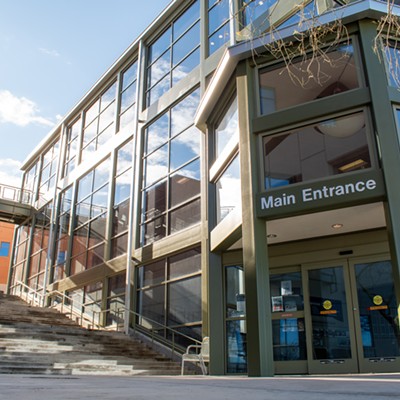Anyone can currently attend Pima Community College and take for-credit classes—with no GED or high school diploma necessary.
However, Pima Chancellor Roy Flores wants to change the school's policy to require that anyone who wants to take for-credit college-level classes has a GED or a high school diploma, and take an entrance exam.
At a July forum focusing on Pima's admissions policy, opponents of Flores' proposal pushed for the college to take other actions that wouldn't end the school's open-enrollment tradition, according to former campus president Sylvia Lee.
Lee says former state legislator Phil Lopes got to the point when he asked Flores why the college won't consider changes in how students are taught in remedial developmental-education classes, which are designed to bring struggling students up to a college-worthy level. One idea is to give students more time to improve in math or reading, and not simply stick to a semester system.
Flores told the Tucson Weekly that 80 percent of the college's 70,000 students qualify for some type of remedial class in math, writing or reading—and about 2,300 students each year who enter without a high school diploma or GED fail due to a lack of skills.
"We take their money, and they buy expensive text books and then end up failing, burdened by debt and student loans. It isn't fair when you have no chance of succeeding," Flores says. "To shoehorn these students into traditional classrooms has not been working. This is less about requiring a high school diploma, but more about, 'How we can help you?'"
However, others—including Lee, Lopes and former campus president Miguel Palacios—see the issue differently. They've started the Pima Open Admissions Coalition and have written a letter of opposition, signed by more than 50 supporters.
"If I am a single mom, and I have two jobs, I can get the Pell grant and go back to school. Maybe I'll give up one of my jobs to go to school, but if I go on this "Pathways (to Pima)" program that Chancellor Flores wants to develop, there is no financial aid, and if I'm a needy student and want to become a dental hygienist, I may stay where I am," Lee explains. "So, then, we leave out a whole group of people in Tucson who want to better their lives, but will never get that chance."
Flores says the policy change is tentatively scheduled to take place by the summer of 2012. Flores also wants to create that new "Pathways to Pima" program, designed to place lower-level students in classes that can help them get a GED before they transfer to an occupational program or begin taking college-level courses.
Flores also wrote that the proposal would not only require a GED or diploma, but also passing a test "above a minimum level established by Pima Community College" that will be given to all students. Currently, all students take an assessment test, but only to determine whether remedial assistance is needed, according to Flores.
In response to early criticism of the proposal, Flores issued a report last month to explain that Pima is not eliminating developmental education, since 80 percent of those who enter Pima and succeed still need remedial assistance in math, reading and writing.
Those who don't meet the new admission standards could benefit from the "Pathways to Pima" part of Flores' proposal—although what those pathways will look like remains undetermined. Flores mentions in his July report that Pima's Center for Training and Development could be part of "Pathways." The center "helps approximately 500 people a year prepare for meaningful employment, and can help those with or without a high school credential. Also, PCC last year received a record $26 million in grants. A substantial portion of that funding is for programs which prepare undereducated students, dislocated workers and the needy for jobs and careers."
Flores also mentions the college's Adult Education Program (which Pima helped keep alive with additional funding through 2012, after the state Legislature eliminated funding two years ago). Adult-education programs in Arizona, such as the one at Pima, serve more than 42,000 people a year, with many people using the programs for GED testing and instruction. In 2009, according to the Arizona Department of Education, out of 21,000 adult-education students who took GED classes, about 14,000 received high school-equivalency diplomas.
"PCC remains committed to supporting Adult Education. It also should be noted that a long-term funding solution is needed to sustain Adult Education, which helps working-class adults and their families achieve their dreams," wrote Flores.
However, Lee says she questions the data Flores uses to show that a change in the enrollment policy is needed. In a presentation Flores made on the proposal to the Pima County Workforce Investment Board in June, Lee says, Flores claimed that new high school graduates are often not ready for college. However, Lee says half the student population at Pima is older than 25—in other words, not new high school graduates. She also says that Arizona has one of the highest high school dropout rates in the country, and those dropouts are the people who often benefit most from the open-enrollment policy.
"We want to get three votes on the Pima board to either stop this or find some middle ground," Lopes says. "We don't know what the middle ground is, but (we want to) at least postpone this for several years and take a different look at developmental education. Don't give up on it, and don't give up on the students who need the college to remain open to everyone."













